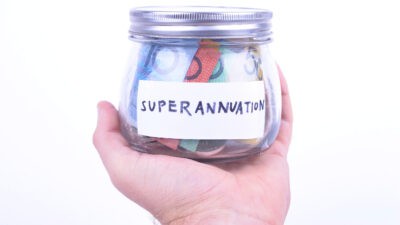
Image Source: Getty Images
I spend much of my professional life trying to do one simple thing: encourage our members and readers to delay gratification.
To eschew the short term for the long term.
To pass on the sugar fix, in the interests of better nutrition.
Yes, essentially my job is to get you to eat your financial broccoli.
Which kinda underscores the challenge, right?
It's not a thankless task — many people tell me how we've helped them afford a more comfortable retirement, or that we've shown them a better way to achieve that goal in future.
But some days I do feel like Sisyphus, pushing a stone up a hill only to have it roll back overnight.
I think that's because the struggle is against our human instincts; we're just not built — we haven't evolved — to think long term, or in compound terms.
A bird in the hand, we're told, is worth two in the bush. Which isn't wrong, per se, but is the sort of thinking that stops us building for the future.
We just can't help but take the easy win now, and let 'future us' worry about paying the price, later.
That evolution is my Sisyphean stone.
The obvious one is saving for the future.
A dollar, today, for a newborn, would be worth $500 by retirement, if it earned 10% per annum – the approximate return of the developed world's stock markets — over that time.
We can't all start at birth, but the value of compounding is often simply not understood, or too hard for people to do. Or both.
Despite the overwhelming maths.
The same sort of short-termism infects policy decisions (and, in all probability, elections).
Exhibit A is the inability or unwillingness of political parties to see past the next election.
But a less obvious version of the same influence is that, to some extent, the pollies do it because that's the way the electorate thinks, too.
We want the short-term fix. The sugar hit. The here-and-now.
It infects our tax policy, for example.
Given the choice between a small reduction in tax rates, or a policy that would create a stronger long-term economy (presumably with more jobs, higher wages, and higher standard of living), we routinely vote for the former.
(And just this morning, a Nine Newspapers survey reported that most of us want to hit Net Zero carbon emissions by 2050, but also don't want a carbon price. If you can square that circle, you're better than me.)
The latest is some companies that are planning to dock employees' take home pay to meet their increased Super Guarantee obligations when the rate moves from 9.5% to 10% of salary at the beginning of next month.
I wrote about this issue on the weekend. It is, to my mind, unconscionable.
More mind-bogglingly, the federal government minister in charge of Superannuation, Senator Jane Hume, doesn't seem to care. A news.com.au article over the weekend begins:
"Superannuation Minister Jane Hume has delivered a blunt message to unions complaining that some bosses will force workers to pay for their own super rises on July 1.
"Explaining why she doesn't plan to do anything about the practice, Senator Hume has told news.com.au that it's a simple fact that there was a trade off between wage increases and super rises."
Schadenfreude? Disinterest? "You deserve it"? I'm not sure.
But it is mind-boggling from the Minister in charge of this important portfolio.
(There apparently is no trade-off for negative gearing and house prices. Or JobKeeper paid to companies that subsequently delivered record profits. But I digress. A little.)
My point isn't political, though. It's economic. And financial.
The government should want a sustainable retirement savings system, and to remove pressure from the future federal budget. She should want robust take-home pay, to help continue the economic recovery. The RBA itself is calling for wages growth. The government seems to be singing from a different hymn sheet.
But my focus today is on those companies taking the opportunity to slip through that particular loophole, helpfully kept open by the government.
Companies who, we assume, want to be employers of choice.
Companies who, we assume, spend a small fortune each year on employee morale and hiring.
Companies who, we assume, want to be seen by customers and suppliers as 'good corporate citizens'.
And yet…
And yet, the ABC reports this morning that some of our largest companies are taking the opportunity to make some of their employees fund this increase from their own take-home pay.
The national broadcaster lists Telstra Corporation Ltd (ASX: TLS), AGL Energy Limited (ASX: AGL), Australia and New Zealand Banking Group Limited (ASX: ANZ) and Macquarie Group Ltd (ASX: MQG) as companies who are going to do so.
(To be clear, I haven't independently contacted these organisations for confirmation, but I have no reason to believe the ABC's report is incorrect and I trust their processes.)
Further, it includes this paragraph:
"Research firm Mercer recently surveyed 145 organisations. It found almost two-thirds of organisations with a "total package" approach – where their super is bundled in with their salary — were passing on at least some of the cost to employees."
Frankly, I think it's unconscionable.
But, that aside, how do these companies think it will impact employee morale and 'discretionary effort'?
For the sake of cribbing half of one per cent of some salaries back from those employees?
Don't you think they'll feel just a little ripped off? Demotivated? Unappreciated.
Let's invert it: don't you think most employers would happily pay another 0.5% to fix a dissatisfied, demotivated, unhappy workforce?
And yet, they're risking exactly that outcome, for a measly fraction of one percent of their total employment costs for those employees.
It boggles the mind.
And it brings to mind the warning not to be 'penny wise, but pound foolish'.
Telstra and Macquarie are active recommendations in different Motley Fool services. Were they to ask, I would recommend they pay the extra Super, and celebrate that fact with their staff.
It would be a very cheap employee benefit, and a way to show those companies as employee-friendly and genuinely caring about their staff.
In a tightening employment market, the decision seems — to me, at least — a no-brainer.
A modern business should want the best staff, giving their best.
The best businesses will get exactly that.
The companies that embody Ebenezer Scrooge on Christmas Eve? Not so much.
As an investor, I'm looking for companies that employees want to join, and don't want to leave.
I want to know their teams are pulling, hard, in the same direction, because they want to.
I don't have access to Mercer's list. But if I was a betting man, my $2 says the group of companies that reduce take-home pay underperforms the group of those who pay the higher Super contribution without making its employees fund it.
Not because of karma. Or because I want it to be true.
But because having the best staff, who are motivated and energised, is a competitive advantage. The best companies realise that and act accordingly.
Fool on!








